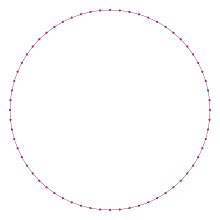Hexacontatetragon
| Regular hexacontatetragon | |
|---|---|

A regular hexacontatetragon
|
|
| Type | Regular polygon |
| Edges and vertices | 64 |
| Schläfli symbol | {64}, t{32}, tt{16}, ttt{8}, tttt{4} |
| Coxeter diagram |
|
| Symmetry group | Dihedral (D64), order 2×64 |
| Internal angle (degrees) | 174.375° |
| Dual polygon | Self |
| Properties | Convex, cyclic, equilateral, isogonal, isotoxal |
In geometry, a hexacontatetragon (or hexacontakaitetragon) or 64-gon is a sixty-four-sided polygon. (In Greek, the prefix hexaconta- means 60 and tetra- means 4.) The sum of any hexacontatetragon's interior angles is 11160 degrees.
The regular hexacontatetragon can be constructed as a truncated triacontadigon, t{32}, a twice-truncated hexadecagon, tt{16}, a thrice-truncated octagon, ttt{8}, a fourfold-truncated square, tttt{4}, and a fivefold-truncated digon, ttttt{2}.
One interior angle in a regular hexacontatetragon is 174 3⁄8°, meaning that one exterior angle would be 5 5⁄8°.
The area of a regular hexacontatetragon is (with t = edge length)
and its inradius is
The circumradius of a regular hexacontatetragon is
Since 64 = 26 (a power of two), a regular hexacontatetragon is constructible using a compass and straightedge. As a truncated triacontadigon, it can be constructed by an edge-bisection of a regular triacontadigon.
The regular hexacontatetragon has Dih64dihedral symmetry, order 128, represented by 64 lines of reflection. Dih64 has 6 dihedral subgroups: Dih32, Dih16, Dih8, Dih4, Dih2 and Dih1 and 7 more cyclic symmetries: Z64, Z32, Z16, Z8, Z4, Z2, and Z1, with Zn representing π/n radian rotational symmetry.
...
Wikipedia
